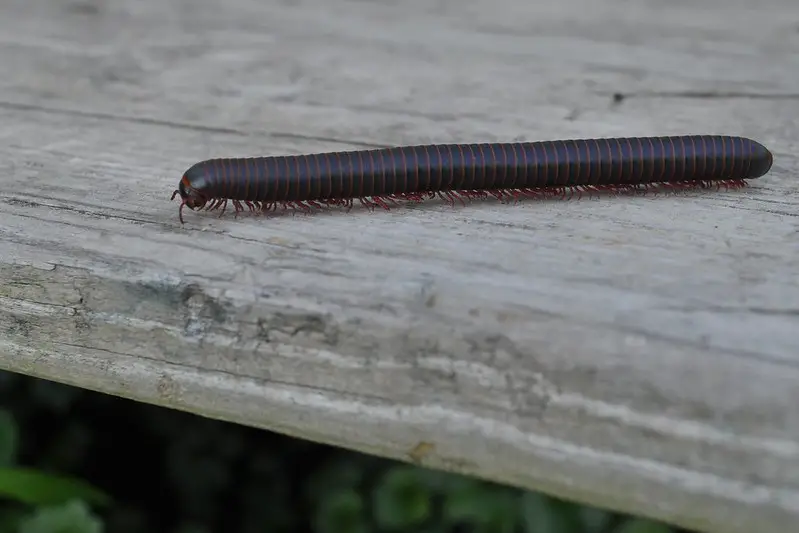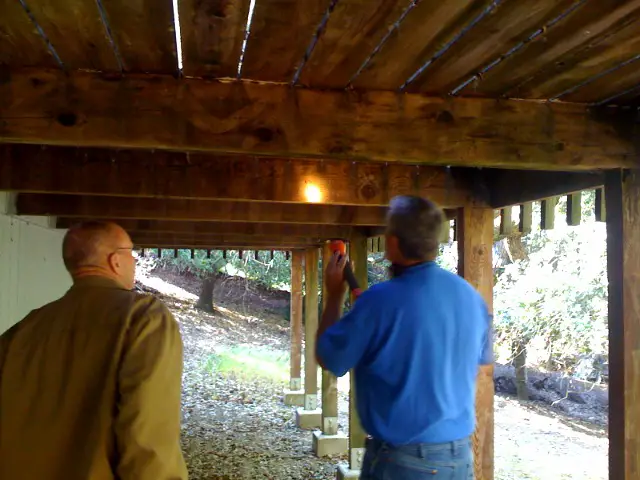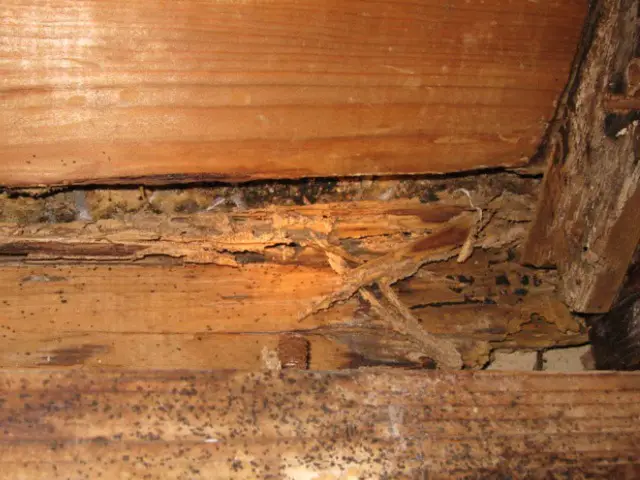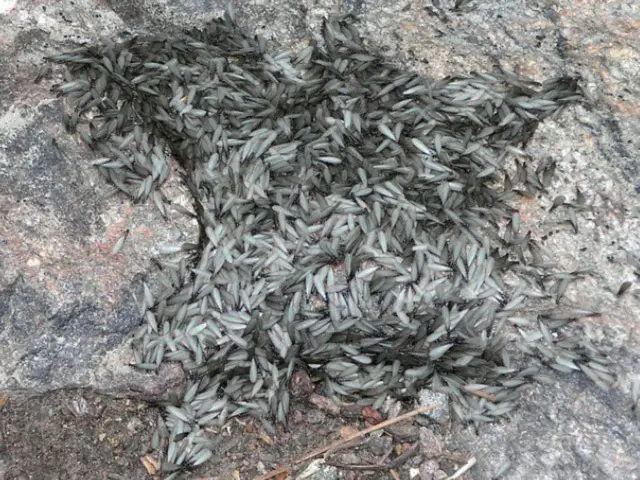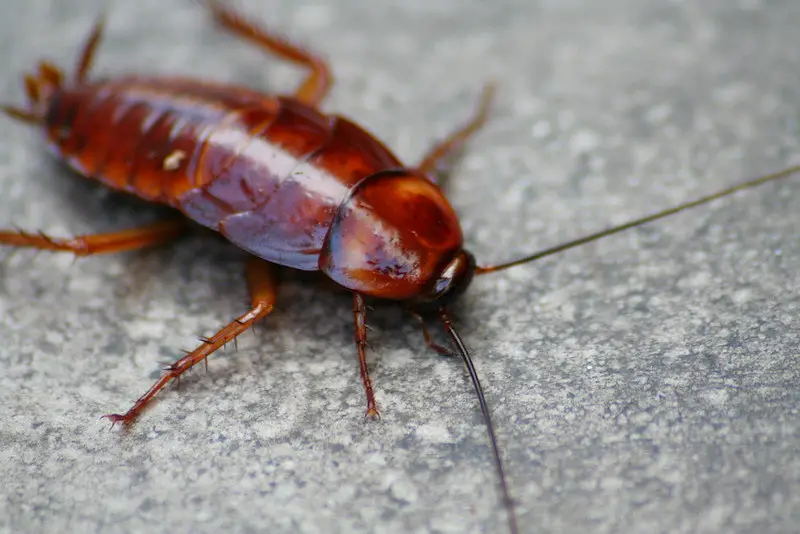It’s not unusual for millipedes to overwinter in houses in North Carolina. They enter your home when the temperatures drop and only come out again when the temperatures rise. That’s the reason you see millipedes around your North Carolina house in warmer months.
They’ve been in your house getting through winter, getting ready to lay up to 300 eggs at a time. If you think that’s a lot of millipedes, you are correct. If you don’t get rid of millipedes fast, you could have an out-of-control millipedes infestation in your North Carolina house.
Millipedes are common in North Carolina. Fortunately, these strange-looking creatures aren’t harmful but can be annoying house pests. But these creepy crawlies aren’t as bad as many other pests, such as cockroaches and termites. In North Carolina, millipedes are more of a nuisance.
There are many millipedes species, some of which are common in North Carolina. Millipedes are most attracted to North Carolina houses with high humidity.
When dealing with North Carolina millipedes and other pests like roaches, termites, ants, spiders, fleas and bed bugs, it’s best to get rid of them fast. Use effective preventative measures to keep them out of your home. And if suddenly your house is invaded by millipedes, you might ask: “How to get rid of millipedes?”
Millipedes can be hard to get rid of when they invade your house in large numbers. When dealing with a millipedes invasion, you must figure out what attracts these pests to your North Carolina house. Generally, millipedes enter the house in search of shelter or moisture. So, getting rid of them is easy if you get rid of the excess humidity.
Fix ventilation, plumbing leaks, and drainage work. Patch updrafts, and buy a few dehumidifiers if you continue to have problems. All of these measures should make your house less attractive to millipedes.
Getting rid of North Carolina millipedes is simple. Swipe them up and remove them from the house. If you don’t want to get near these pests, you can eliminate them with a vacuum cleaner. But don’t squash them because they can emit a foul odor that could trigger an allergic reaction.
North Carolina Millipedes: Overview
Millipedes are nuisance pests in North Carolina. As long as they stay in your garden, they can be beneficial. These pests are attracted to moist places and occasionally wander into houses, similar to earwigs.
The name “millipede” means “thousand legs,” but millipedes never have that many legs. In fact, millipedes have about 90 pairs of legs, which is still impressive but not one thousand.
Related posts:
- How To Get Rid Of Millipedes In California?
- How To Get Rid Of Millipedes In New York?
- How To Get Rid Of Millipedes In Georgia?
- How To Get Rid Of Millipedes In Ohio?
- How To Get Rid Of Millipedes In Michigan?
Quick Facts About Millipedes in North Carolina
Millipedes cause no damage to the house, and they don’t spread diseases like cockroaches and don’t damage your house like termites. And millipedes will never try to take over your house as ants try on occasion.
Their bodies are cylindrical. They are mostly black, brown, or black, but you might see some orange or red. Millipedes feed on rotting, decaying organic matter such as rotting leaves and wood. Under the right circumstances, a millipede can live up to seven years.
Are there millipedes in North Carolina?
There are millipedes in North Carolina. The millipedes species found in North Carolina are:
- North American millipede (Narceus americanus)
- Greenhouse millipede (Orthomorpha gracilis)
- Yellow Banded millipede
- Red Rusty millipede
Why do I have millipedes in my North Carolina house?
Millipedes often look for moisture or shelter in North Carolina houses. You may find these harmless pests in dark or quiet parts of the house.
Although millipedes are naturally attracted to damp, dark places, you might find them in your home in North Carolina. But, mostly, you will find them in areas with decaying organic matter.
Mulch piles, leaf piles, compost, and rotting logs are common millipedes hiding places. They favor quiet, moist areas in the house like bathrooms, attics, basements or near your washing machine.
How to get rid of millipedes in North Carolina?
The best way to get rid of North Carolina millipedes is to keep them out of the house. You can stop millipedes from getting into your house by sealing cracks, crevices and openings. They often get into the house around the foundation, plumbing, and wiring, so pay close attention to these areas.
Another way to get rid of millipedes in North Carolina is to use dehumidifiers. Since millipedes are attracted to moist places, keeping the air dry in your house will keep these pests out. If you don’t have a dehumidifier, you can use fans for the same purpose.
The moisture from any leaks will attract millipedes, so it’s best to repair leaky pipes of faucets to keep these creepy crawlers out of the house.
You can get rid of millipedes by removing the food source. Since they feed on decaying organic matter, such as rotting wood and leaves, you should clean out organic debris from gutters. A clean gutter will drain correctly, making it less attractive to millipedes.
Remove piled-up woodpiles or mulch that store moisture and attract these pests, and keep your yard clean by regularly removing dead plants.
How to get rid of millipedes in my North Carolina house?
You can easily get rid of millipedes in your house in North Carolina if you seal and caulk cracks and crevices, create a bug barrier, remove their hiding place, keep the gutters free of decaying organic matter, and repair leaky pipes and faucets.
Related posts:
- How To Get Rid Of Millipedes In Florida?
- How To Get Rid Of Millipedes In Texas?
- How To Get Rid Of Millipedes In Illinois?
- How To Get Rid Of Millipedes In Pennsylvania?
How to get rid of millipedes naturally?
You can get rid of millipedes naturally using diatomaceous earth. It is a fine, chalk-like powder, which is nothing more than the fossilized remains of single-celled aquatic microorganisms.
Diatomaceous earth is found naturally and used as an organic insecticide. It effectively eliminates millipedes and other pests such as roaches, ants, bed bugs, earwigs, spiders, silverfish, slugs, snails, and fleas.
Boric acid is another way to get rid of millipedes naturally. It’s causing millipedes to dehydrate slowly. But you shouldn’t use boric acid around children and pets.
Are millipedes in North Carolina poisonous?
North Carolina millipedes are not poisonous. This worm-like pest has glands that can produce irritating fluids that may cause an allergic reaction in some people.
Are North Carolina millipedes pests or not?
Millipedes can become pests if they invade your house, but they aren’t particularly harmful. Unlike cockroaches, termites, ants, bed bugs, fleas, and mosquitoes, millipedes are pretty harmless, even if they get inside your house.
Millipedes don’t sting, bite, contaminate food, transmit diseases, poison or destroy the wood structure of your house.
Types of Millipedes in North Carolina
Of the close to 1000 species of millipedes in the U.S., many of them live in North Carolina. The North American millipede (Narceus americanus) is the most common millipede in North Carolina and many other parts of the United States. Although it won’t stay alive long inside your house, you might find Greenhouse millipedes in your North Carolina home.
How to get rid of millipedes in the bathroom?
You can manually remove millipedes from the bathroom. Don’t squish them since they might release a foul odor. To remove millipedes, use a broom and a dustpan. Another option is to vacuum them up.
What attracts millipedes to your North Carolina house?
Moisture attracts millipedes to your house. Millipedes could enter your home when weather conditions aren’t ideal outside. They can invade your house in large numbers via expansion joints, cracks, crevices, wall voids, or doorways.
Millipedes don’t stay alive in a house long. Your house doesn’t have enough moisture to keep millipedes alive for longer than a day or two. If millipedes infest your home, it may be a sign that they are breeding close to your house.
How to get rid of millipedes in the bedroom?
You can get rid of millipedes in the bedroom. The easiest way to eliminate millipedes from your bedroom is to either vacuum or sweep them up with a broom and a dustpan.
Are North Carolina millipedes dangerous?
The people who live in North Carolina don’t have to worry about the dangers of millipedes. Millipedes are not dangerous to humans, but their defensive fluids are unpleasant. Some people have reported skin irritation when handling millipedes.
Luckily millipedes don’t bite like fleas, contaminate your food like ants, carry disease-causing bacteria like cockroaches, or feed on the wood frame of your house. What’s more, millipedes don’t bite or sting, making them one of the most harmless garden pests around the house.
Are millipedes harmful to dogs?
Millipedes aren’t harmful to dogs because they aren’t toxic and don’t bite or sting. But the foul smell from the crushed body of millipedes could result in an allergic reaction or discomfort in dogs.
